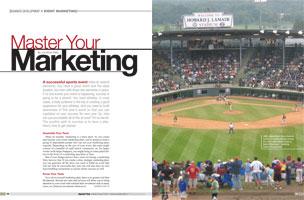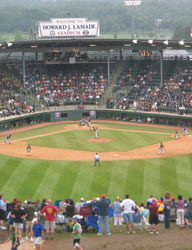
 |
| Little League World Series Game in Howard J. Lamade Stadium during the Little League World Series in South Williamsport, Lycoming County, Pennsylvania. |
A successful sports event relies on several elements. You need a great event and the ideal location, but even with those two elements in place, if no one knows your event is happening, success is going to be a stretch. You need athletes. In most cases, a lively audience is the key to creating a good experience for your athletes. And you need to build awareness of this year's event so that you can capitalize on your success for next year. So, how can you accomplish all of this at once? It's no secret. The surefire path to success is to have a plan. Here's how to get started.
Assemble Your Team
Make no mistake: marketing is a team sport. As you create and execute your event marketing plan, you're going to need a group of dependable people who can run your marketing plays expertly. Depending on the size of your event, this team might consist of a handful of staff and/or volunteers; or, for larger events (with larger budgets), you might bring in some pinch hitters in the form of a marketing specialist or firm.
But if your budget doesn't have room for hiring a marketing firm, have no fear. If you create a clear, strategic marketing plan, you can generate all the buzz you need to build an event that will not only be successful this year, but will also have its own buzz-building momentum to ensure future success as well.
Know Your Tools
For a do-it-yourself marketing plan, there is no greater tool than the Internet. Several new sites and services will allow you to bring attention to your event with minimal time investment and, in many cases, no financial investment whatsoever.
If you can find a team member who has experience with the Web, wonderful. This will save you time and open up a lot of marketing avenues. If not, it is completely within the ability of even the most novice Interneter to master the applications you'll need to build a Web presence that will keep your audiences' attention rapt and bring them to your event on game day. Those tools include:
Web site. If you have minimal experience with the Internet, building a Web site can be daunting. It may seem impossible. It's not.Even more importantly, a Web site is a crucial link between you and the audiences you're after, and, depending on the level of interactivity of the Web site you build, it can even give them a way to register to participate, to volunteer or even to buy tickets. As a result, a Web site is an inexpensive, highly effective tool that will skyrocket your exposure while also saving you time and money. What could be better?
If you have the budget, you can hire a freelance Web designer to build your site. But you can also build a perfectly serviceable site all by yourself-no experience required-with services like Godaddy.com and Google sites. Another option: find a volunteer who has Web design skills and ask them to donate their time. If you haven't asked what special skills your volunteers have, you should. You might be surprised at the hidden talents you'll discover.
Facebook. More than 65 million people use Facebook, and you should too. Create a fan page for your event and invite everyone you know to join up. Then sit back and watch your event's exposure grow.
Twitter. Twitter is a somewhat trendy marketing tool, but that said, it's very trendy. Particularly if your target audience is age 30 and under, Twitters are an important and simple way to keeping your event visible on your key audiences' radars.
Make your Playbook
Define your audiences. Before you can decide how to reach your target audiences, you need to figure out who and where they are. Are they under 30? Online marketing could be your best bet. If you're marketing to seniors, traditional print media could be more effective. If you're hoping to reach elite athletes, consider targeting the publications and Web sites of their sports' organizations.
 |
| © Brett Pelletier - Dreamstime.com |
Set goals, objectives and tactics. What are your overarching ambitions for this event? Your goal might be growing the event into one of your sport's premiere competitions, or establishing a solid annual youth tournament. With that goal in mind, set specific objectives that will move your event toward it, such as hitting certain attendance or participation numbers or achieving a percentage increase in attendance or participation, revenue generation, etc. Next, decide what tactics will best achieve those objectives. For example, if your objective is to increase local attendance among youth athletes, consider media relations with local newspapers as well as online marketing.
Set the Boundaries
It's pretty likely you'll know your budget, or at least have a general idea of it, before you start planning your goals, objectives and tactics. But keep that number on the back-burner while you brainstorm. First, envision what you truly want your event to be and how you might get there, and once you've done that, go back and align your ideas with your budget. It's a bit like grocery shopping for the perfect meal and then putting back the things you can't afford, but it will force you to think big and out of the financial box.
Partner Up
Speaking of budget, one of the best ways to get a bigger one is to bring in sponsors. In some cases, sponsors will donate in-kind, providing things like refreshments or equipment in exchange for some marketing visibility of their own. In other cases, sponsors will contribute actual cash that can be worked into your budget. Either way, it's critical that once you plan your entire strategy, you analyze that list and explore all the ways potential sponsors can help you hit those targets.
Sponsors can have an intrinsic marketing value of their own as well. If you can bring in sponsors that will appeal to your audiences, perhaps creating a draw for participants, athletes or even other sponsors, those partners will be incredible assets to your overall strategy.
Get the Word Out
Media relations are certainly a higher priority the higher-profile your event aims to be, but regardless of event size, some kind of media relations is an important tactic. Local media relations-communicating with newspapers, radio and even local television-can create major visibility and establish a strong base for your event to grow on.
Successful local media relations are conducted in pretty much the same way as regional or national media relations. Pitch letters and news releases offer easy, cost-effective tools that you can manage without investing too much time. For pitch letters, seek out your event's interesting stories, such as a family of local athletes who are all competing in your event. Write a letter to local editors, radio station news managers and television producers that explains the story and offers the opportunity to interview the participants (be sure you get permission first).
News releases are also a great way to keep the media informed about your event. It's a good idea to send a release announcing the event when you choose the location, as well as several weeks before and immediately after. Highlight the event's schedule, key participants and particularly any parts of the event you'd like the community to be involved in.
Go Long
Marketing might seem like one of the to-dos that can easily slip off your event planning list, but don't let it. If your goal is to establish an event that succeeds and flourishes, especially over the long-term, you have to get the word out. That's why, in many ways, marketing can be as critical as bringing the right equipment on event day. Without the people, you can't play.

